On the second floor of a hotel in the shadow of the CN Tower, Wet’suwet’en hereditary leadership and their allies crowded around laptops and cellphones for one purpose: confront RBC executives over the bank’s financing of the Coastal GasLink pipeline.
Chiefs Namoks, Gisdaya and Madeek, and others from the nation, travelled from their unceded territory in northern British Columbia — where the pipeline is currently under construction and land defenders have been arrested at gunpoint — to attend the bank’s annual general meeting (AGM) in downtown Toronto Thursday morning. But late Wednesday, RBC cancelled the in-person portion of the AGM, citing concerns about COVID, and shifted the entire meeting online
Not all shareholders were informed of the move ahead of time, and so, anticipating RBC representatives might be at the original in-person location to tell people, Wet’suwet’en chiefs began the day by marching from their hotel to the convention centre where the meeting was meant to take place. When they arrived, they found no representatives from the bank and left.
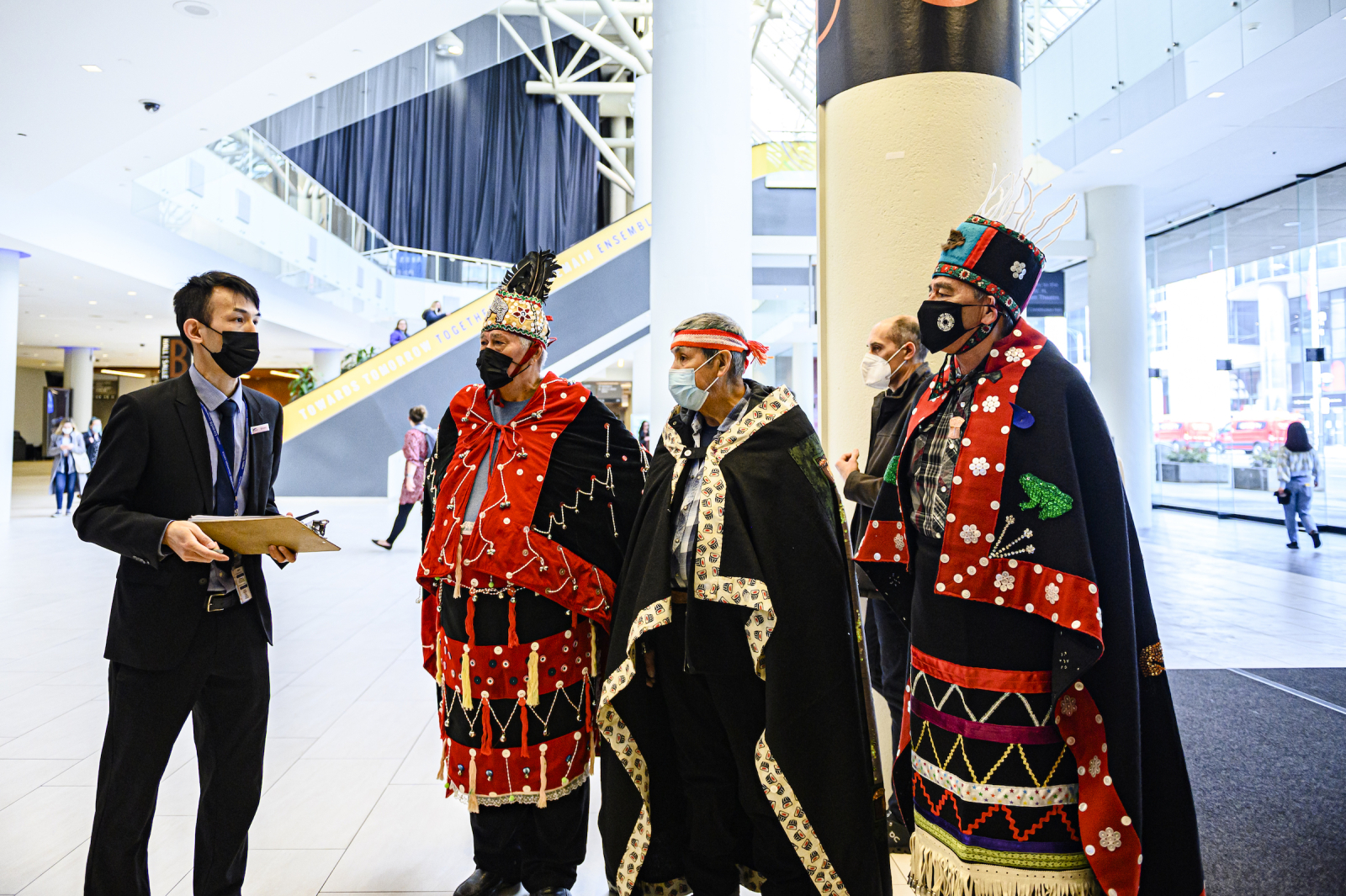
Chief Namoks called it an insult he won’t ever forget.
“Today is one of the highest insults I've ever received as a chief,” he said. “You’ve seen the violence (on Wet’suwet’en territory); I think today's insult was bigger.”
“They wouldn't even send anybody out to apologize for cancelling the RBC meeting on such short notice. We travelled across from our lands in British Columbia to here, and they don't even apologize to high chiefs? … They pretend we don't exist, and every aspect, they treat us as if we're not human.”
With the original plan to challenge RBC executives in person squashed, Plan B involved getting on the phones and hoping for the opportunity to ask a question at the virtual meeting. It worked. The three chiefs asked back-to-back-to-back questions, challenging RBC CEO Dave McKay over the bank’s financing of Coastal GasLink, a pipeline expected to carry 2.1 billion cubic feet of natural gas per day, if built, to the LNG Canada Kitimat facility for export. McKay responded to — but didn’t exactly answer — the questions, as several in the room commented.

As McKay cycled through familiar talking points about the economic benefits of the pipeline, characterizing the nation as divided on the issue, jaws dropped and eyes rolled among Wet’suwet’en allies.
Chief Gisdaya asked how RBC was accountable to its human rights statement, which says the bank will avoid contributing to “adverse human rights impacts.”
“The pipeline defies the human rights of our young people by threatening their ability to feed themselves and practice their culture,” he said. “How is RBC being accountable to this policy, their shareholders, our human rights and the rights of our young people by continuing to fund the Coastal GasLink pipeline?”

McKay said he wanted to assure the chief that first and foremost, “RBC only supports projects that are environmentally and socially responsible.”
McKay then said with respect to Coastal GasLink, the pipeline has been approved and enjoys the support of 20 elected band councils — an irrelevant point, considering the Wet’suwet’en hereditary leadership have not consented and actively oppose construction through their territory. Coastal GasLink reached agreements with First Nation band councils along the project’s route, including Wet’suwet’en bands, and there is both support and opposition among members of the nation. However, hereditary Wet’suwet’en chiefs oppose the project, and it is the hereditary chiefs who hold authority over the land in question.
"I know there are divisions within parts of the community, and I know it's important that we respect that the First Nations need to resolve specific disagreements within their own communities,” McKay said.
“We're certainly willing to play any role if asked to help mediate those discussions,” he added.
In an interview with Canada’s National Observer, Gidimt’en Checkpoint spokesperson Sleydo’ rejected the characterization of a divided nation in need of mediation and said it was a divide-and-conquer tactic.
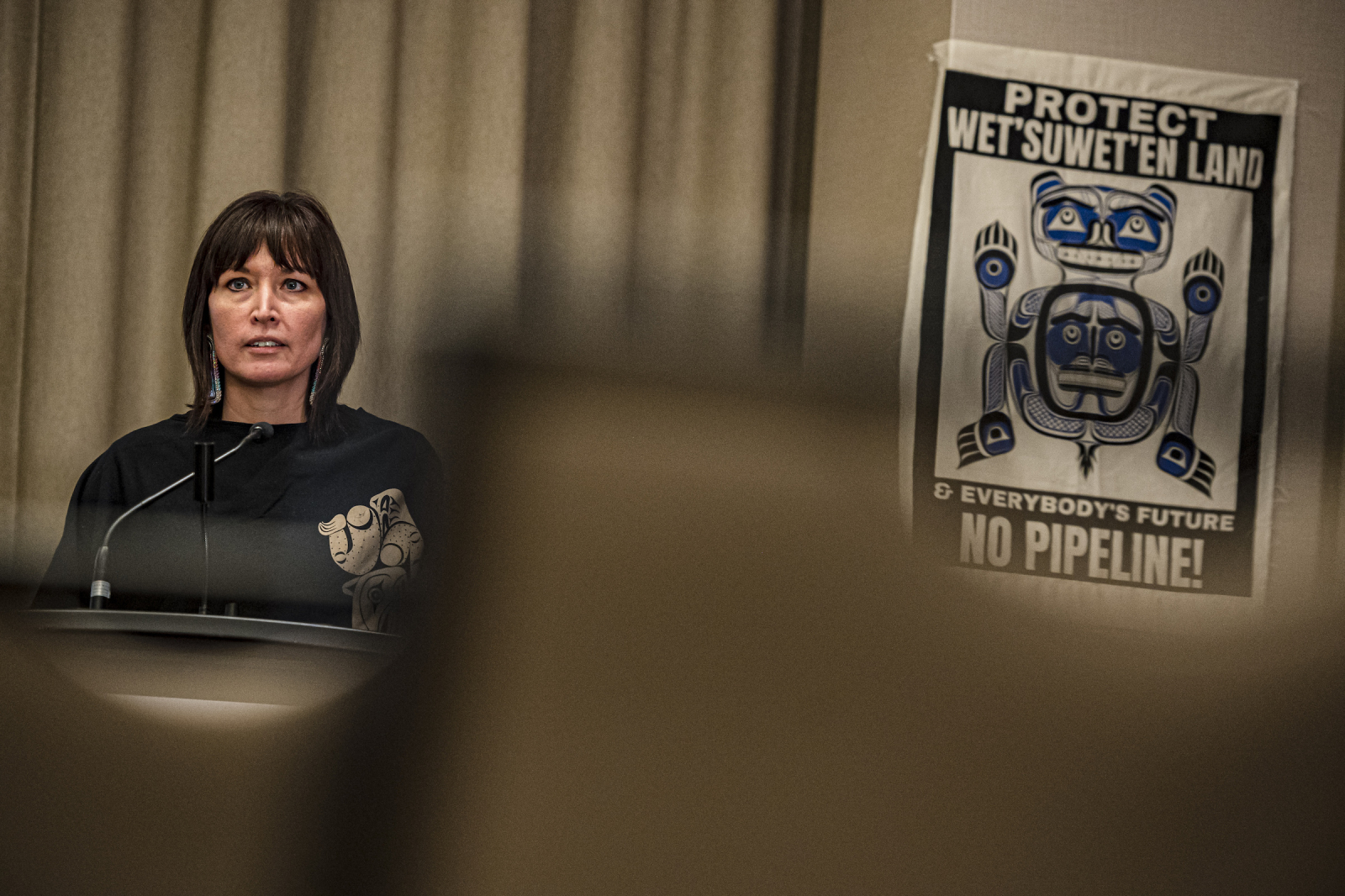
“He tried to direct the conversation and focus on so-called divisions within our community, and I think that's what a lot of people do,” she said. “Even if there was division within our community and within our hereditary system, it does not negate the fact that Wet'suwet'en hereditary chiefs are the full jurisdiction on the land.”
The question of who has jurisdiction over the Wet’suwet’en traditional territory is long settled. In 1997, the Supreme Court of Canada recognized in its landmark case Delgamuukw v. British Columbia that Canada did not extinguish Wet’suwet’en title to the land. That case acknowledged the nation’s hereditary governance structure, meaning Wet’suwet’en law is recognized by Canada’s highest court and authority over the nation’s land lies with the hereditary chiefs.
Following the virtual AGM, Wet’suwet’en leaders spoke to a crowd of supporters gathered in a nearby park. Chief Namoks said the nation was asking RBC and its shareholders to “be human.”
“When we work together to put pressure on financial institutions such as RBC, that's where you make a difference,” he said. “We need to stand together. Pull your money out of such banking institutions like RBC.”
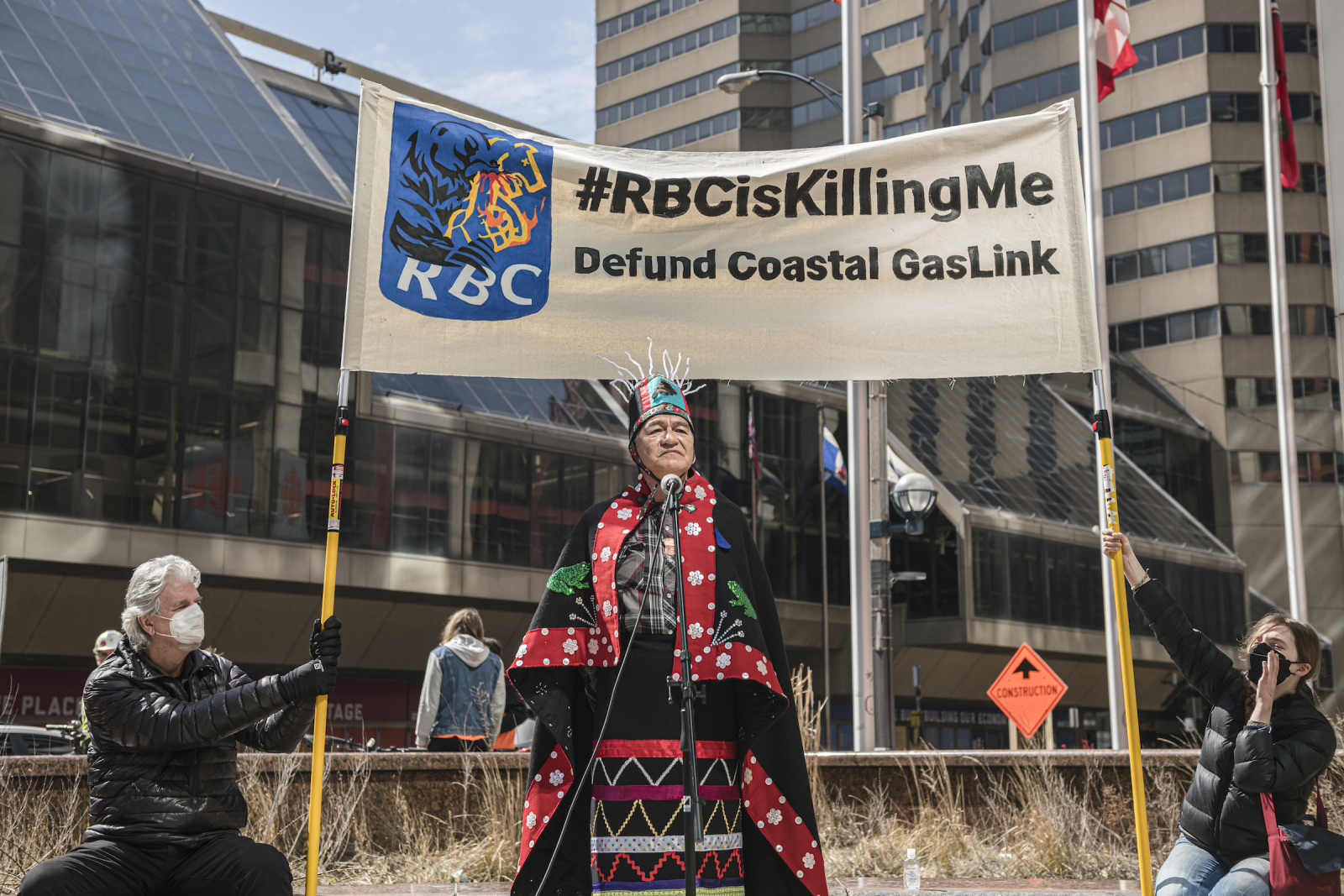
Speaking to the same crowd, Chief Gisdaya warned of the climate risks of continued fossil fuel investment.
“I used to look forward to the summer,” he said. “Now I'm scared because of all the fires, and it's coming closer up north.
“It's just the beginning and it's going to get worse yet if they don't change now. Not 2030; it has to be now.”
Across the country, solidarity protests outside of RBC branches were held.
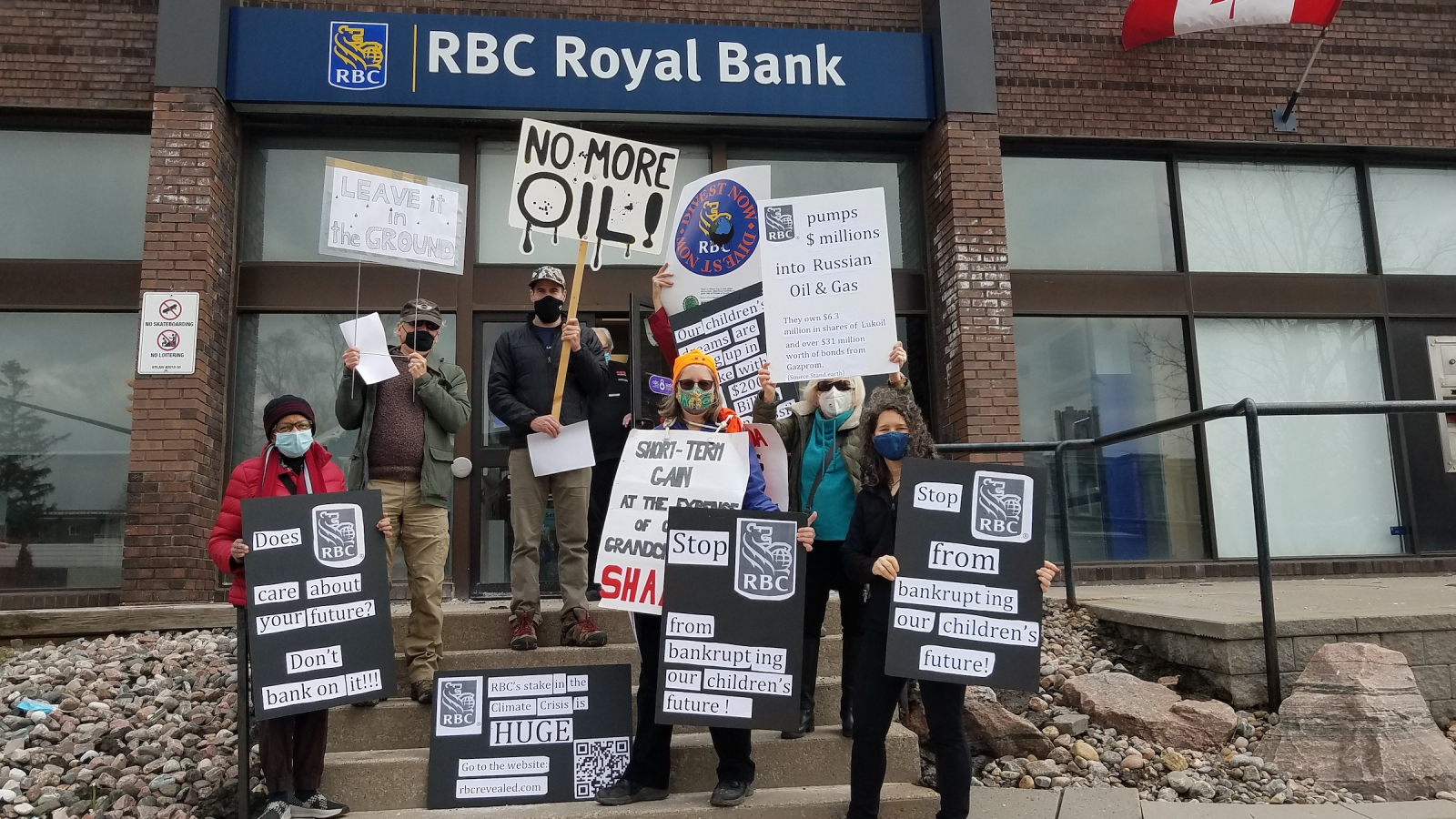
“For RBC customers concerned about the climate crisis and climate chaos, RBC management demonstrates extreme commitments to ‘horse and buggy’ industries,” said Mike Benedict from Extinction Rebellion Ottawa. “RBC must change or perish.”
Banking on a Better Future youth organizer Aishwarya Puttur said in a statement RBC is “killing our chances at a livable future.”
“Youth are key for RBC’s business, but how can RBC expect young people to bank with them when they are actively financing the leading cause of the climate crisis, destroying our futures and the current livelihoods of millions of people?” she asked.
TC Energy is building the Coastal GasLink pipeline to feed LNG Canada’s Kitimat facility with fracked methane from the Dawson Creek area of B.C. Last year, the Calgary-headquartered fossil fuel giant sold its majority stake in Coastal GasLink to Alberta and South Korea’s public pension plans, managed by investment companies AIMCo and KKR, respectively.
The sale not only generated $600 million for the company, it triggered a financing scheme with dozens of banks that allowed the company to immediately tap about $2.1 billion to pay for the project’s construction. BankTrack identifies 27 financiers of Coastal GasLink that, together, have given the project a $6.4-billion loan.
Among the 27 financiers are Canada’s big five banks — RBC, BMO, Scotiabank, CIBC and TD — along with the National Bank of Canada, JP Morgan Chase, Bank of China, Bank of America, South Korea-headquartered KB Financial Group, Japan-based Mizuho, Mitsubishi UFJ Financial Group and many others. Export Development Canada is also listed as a financier.
One reason why Wet’suwet’en leadership are targeting RBC over its role in Coastal GasLink is sheer size. Among the world’s banks, RBC is the fifth-largest financier of fossil fuels, having loaned or invested over $260 billion to coal, oil and gas companies since the Paris Agreement was signed.

RBC rejects shareholder resolutions
During the AGM, RBC shareholders voted on a series of climate resolutions aimed at improving the company’s performance in bringing down planet-warming greenhouse gas emissions.
Among the proposals were requests for RBC to stop participating in pollution-intensive asset privatization deals, to adopt an annual advisory voting policy to guide climate action and, in a resolution filed by Investors for Paris Compliance, to halt financing for fossil fuel companies under the banner of “sustainability.”
All three proposals were shot down.
The resolution from Investors for Paris Compliance flows from a series of questionable deals RBC inked last year. Among them was a $1.1-billion sustainability-linked bond RBC and several other Canadian banks bought, providing fossil fuel giant Enbridge with cash it could use to build pipelines and pay police to clear Indigenous opposition.
“We’re disappointed that more big institutional investors — including the banks — didn’t vote to tackle the greenwashing of sustainable finance, but we’re pleased we could draw some attention to this critical issue,” said Investors for Paris Compliance director of corporate engagement Matt Price.
“Ultimately, the regulator needs to step in to ensure the integrity of these products if banks and investors won’t do it themselves.”
Thanks for covering this John
Thanks for covering this John. Yesterday, we hung a banner in front of an RBC branch in Thunder Bay as part of LeadNow actions in over 30 locations across Canada. We're going to lose, though, if more people don't stop worrying and become active. The Canadian Government and RBC commitments to climate destruction are clear. We need to hear Antonio Guterres' words and rapidly build the movement big enough to stop this. Huge gratitude to Wet'suwet'en land defenders.
I've slowly lost the belief
I've slowly lost the belief that these guys are really representing the wishes of the Wet'suwet'en First Nation. Too many stories have accumulated from other Wet'suwet'en voices.
And, as a minor point, I would be willing to bet good money at advantageous odds, that they did not travel like Greta Thunberg would have, together in one car, burning half a tonne or so of carbon on the round-trip. Nope; I'll bet they flew, four people would be 4T of carbon for the round-trip. But their time, of course, was valuable.
They used Canada's very
They used Canada's very efficient electric high-speed rail network. Ahhh ... well, no, they flew in helium airships powered by the sun. Waitaminnit, they actually cycled to Prince George then flew in WestJet's fleet of hydrogen-powered planes. ;-)
The sad fact is there are no real wintertime alternatives to flight or gas-burning cars with one exception: EVs. Our deep dependency on fossil fuels isn't a result of choices. Limiting the choice a half century ago was by design, and society bought into it.
Moreover, the chiefs travelled because they had no choice, unlike National Observer staff going to COP 26 in the middle of a peaking COVID wave in an infection hotspot when digital attendance and local person reportage with video links was always on the table. Only on the day of the RBC conference and after the chiefs booked in did the digital conferencing option crop up after RBC's pullout from crowded, in-person conference attendance on likely semi-justified concerns over COVID.
Note that the chief's total emissions amounted to less than 1 / 1,00,000th of the combusted volume of the cargo on an LNG ship.
I've been reading my
I've been reading my grandmother's diary from 1910, as I digitize it. She was in Toronto for school, noted that Father came to town, did two days of business, went back to Lethbridge. That's a 10 day trip, 2 in TO and four each way on the train.
Nobody thought anything of it, save that it had been six days on the train, a generation before.
You write humorously, as if spending 4 days driving a car were such a gigantic, onerous burden that nobody would really, seriously, ask four people to put up with it, that's just crazy talk.
But it was normal, not just for my grandmother, but for the childhoods of people still walking around, the early 1960s. Air travel was for the "jet set", the 1%, when I was in kindergarten.
You can call it a "climate emergency". Or you can prioritize a few days of your time more highly than a tonne of carbon. You can not do both.
Good grief, Roy: do you
Good grief, Roy: do you actually think that any of our governments represent the wishes of the Canadian populace?
To be blunt about it, It does not matter what you believe, or any other apologists for the oil and gas industry.
The Supreme Court of Canada ruled on the matter a quarter of a century ago, in favor of the traditional governance structure, and against whatever else you might prefer.
Your druthers don't determine the governance of the Wet'suwet'en or other First Nations, any more than Russia's wishes should be a concern of Ukraine.
You might do the world and its inhabitants, human and otherwise, a favor, by educating yourself on the matters at hand, including the SCC decision and the state of the climate. And then educate your own politicians, in your own govenance structure, and vote for life, instead of destruction.
Given that such large amounts of warming gases are not tallied, that we have never (ever, ever, ever-ever) embraced a carbon reduction target that would keep Canada, let alone the rest of the world, habitable, and that we have never met the pathetic goals we set, we are well on the way to complete destruction. Are you aware that just as there are "spontaneous" wildfires in evergreen forests, there are also "spontaneous" fires in the Canadian far north? Not much to burn there, but the peat. And it smoulders for a long time. Releasing carbon instead of holding it as it's done for centuries.
Whether or not the Supreme Court ruled, the planet's inhabitants cannot withstand any more gas and oil. It has to stop. Please start making steps to align yourself with life, instead of with oil and gas.
The hereditary chiefs have
The hereditary chiefs have every right to test their case in court. It took decades to come to the landmark 1997 Delgamuukw Supreme Court decision that states, in part, Indigenous rights were never extinguished and still exist. That was a milestone case.
RBC, the RCMP, the Canadian and foreign private and public fossil companies, and the BC + Canadian governments all seem to be working against the grain of Delgamuukw. The SCC would need facts with tremendous weight to alter the 1997 precedent in any new court case, which could get complicated if elected band councils register as intervenors and work against the hereditary chiefs that the law states have the final decision.
Either way, the rift within this and other First Nations may presently work for the ideals of environmentalists who oppose the GasLink project today (LNG and fracking are very harmful to global and local emissions). But this issue should be given time to work out options and alternatives as an equally controversial quandary could erupt on more benign infrastructure projects, such as transmission corridors for clean electricity or pipelines carrying fresh water from the rain coast to the dry interior for cities and farms.
Clearly, all this evolved from the fact that "jurisdiction" over the land was grabbed by non-Indigenous interests without consultation, fair treaties, compensation or representation. What irony that the chickens have come home to roost after 155 years of development.
In the end, the hereditary chiefs can still say No on this one and be backed by the highest court in the land
From the Delgamuukw decision.
From the Delgamuukw decision. Paragraph 115 -
115 A further dimension of aboriginal title is the fact that it is held communally. Aboriginal title
cannot be held by individual aboriginal persons; it is a collective right to land held by all members of an
aboriginal nation. Decisions with respect to that land are also made by that community. This is another
feature of aboriginal title which is sui generis and distinguishes it from normal property interests.
...the Courts will back them if they establish that they have been chosen to speak for the nation. The whole reason that CGL is moving along, and the RCMP are guarding them, is that the abovementioned chiefs did take this to court, and the court took notice that they had not so established themselves as spokesmen for the community. The difference between the band councils and chiefs was noted; the challenges to the chief's claim to the position was noted, the question of whether they stripped the "matrilineal coalition" of legitimate titles, the fact that the clan and house that one claimed to represent had changed from one submission to another.
So, they lost in court, the pipeline went ahead, and those darn band councils have been re-elected. Some, repeatedly.
Delgamuukw was admired, above all, as a uniter, who built a complete coalition, getting all the Wet'suwet'en, of every house and clan, behind him; that's really why the courts decided for him. If these chiefs want to show leadership, they can follow him, show a court that they do represent the *whole* nation, the way he did, then, yes then, the highest courts in the land will find on their behalf.
>> Supporters of hereditary
>> Supporters of hereditary chiefs can point to the Supreme Court of Canada case Delgamuukw v. British Columbia, which found the nation’s hereditary leadership has jurisdiction over its traditional territory, as justification for their efforts to block the pipeline. But, because the company was issued permits by the province, the B.C. Supreme Court granted Coastal GasLink an injunction that the RCMP is using to clear Indigenous people from their land to allow construction to continue.
>> Not having the consent of the Wet’suwet’en Nation’s hereditary chiefs to build through unceded territory is a problem for several reasons. Free, prior, and informed consent is a requirement of the United Nations Declaration on the Rights of Indigenous Peoples (UNDRIP), something that Canada and B.C. have both passed laws to ensure is met. UNDRIP sets out minimum standards that should be followed to protect Indigenous rights and culture.
>> B.C. signed into law its Declaration Act mandating the province align its laws with UNDRIP in November 2019, months before the last major flare-up over Coastal GasLink. Similarly, in June, Canada formally approved its version of the declaration act, which “requires” the federal government to “take all measures necessary to ensure the laws of Canada are consistent with [UNDRIP].”
>> Wet’suwet’en hereditary chiefs are actively fighting Coastal GasLink’s efforts to build a pipeline through its territory. Because the land is unceded, it is crucial to understand the Wet'suwet'en as a sovereign nation that never gave up its self-determination. Its governance structure, based on a clan and house system with hereditary chiefs, has existed for time immemorial and continues to exercise authority over its territory. It is a separate governance system from the elected band council chiefs imposed by the Indian Act.
>> Over 20 years ago, the Supreme Court of Canada ruled in its landmark case Delgamuukw v. British Columbia that Canada did not extinguish title to the land itself. That case was decided in 1997, and West Coast Environmental Law staff lawyer Gavin Smith explains, the decision recognized the nation’s hereditary governance structure.
>> “The Supreme Court of Canada explicitly recognizes that the clan and house system is the fundamental organizing premise of Wet'suwet'en society, which gives rise to its title,” he said.
>> That means Wet’suwet’en law is recognized by Canada’s highest court, and authority over the nation’s land lies with the hereditary chiefs. Smith notes that Indigenous rights are not created through any Canadian legal document. Rather, the rights flow from the fact the nations existed before Europeans arrived — with their own existing laws, systems of governance, and connections to the land.
>> “When we look at what's happening with Coastal GasLink, in my view, the conflict is largely resulting from the long-term failure of the Crown, both British Columbia and Canada, to give meaningful, practical recognition to the promise of recognition for title and rights of Indigenous peoples of the Wet'suwet'en,” said Smith. […] <<
https://www.nationalobserver.com/2021/12/02/news/canadas-supreme-court-r...
__________
Two courts, two decisions. Only the junior court ( BCSC) is acting contrarily to the Delgamuukw decision by the highest court in the land and seemingly contrary to the UNDRIP.
To summarize:
- The hereditary chiefs and ancient clan system of governance are recognized as having the highest Indigenous authority over all traditional territories under the Supreme Court of Canada.
- Elected band councils were imposed under the outdated Indian Act and they represent band members and their limited band territory. Though elections are democratic, a principle we adhere to, Eurocentric governance often working for resource extraction interests was imposed despite the hereditary clan governance that preceded it by about 10,000 years and was never extinguished. Band councils are receiving exclusive attention by the BCSC regarding vested interests, permits and injunctions. This does nothing to bring Indigenous people together to resolve land ownership and jurisdictional management, let alone escape from the European prejudices of the Indian Act.
- The matter has NOT undergone a second look by the highest court in the land. It should.
Further, an extensive and highly informative editorial by Jody Wilson Raybould published in the G&M, also backed the idea that it is the hereditary chiefs that have the final word, irrespective of the disagreements with band councils.
https://www.theglobeandmail.com/opinion/article-who-speaks-for-the-wetsu...
"The hereditary chiefs and
"The hereditary chiefs and ancient clan system of governance are recognized as having the highest Indigenous authority over all traditional territories under the Supreme Court of Canada."
Could you provide a specific reference from a SCC decision supporting this statement, please?
I have also now read Raybould
I have also now read Raybould's piece. Basically, the question she raises, indirectly, is how any non-indigenous actor can recognize or settle aboriginal rights when there is no clear method of establishing the legitimacy of any party coming forth to present those rights.
Raybould does not make this distinction, but hereditary leadershipn and traditional governance must be considered in determining the legitimacy of aboriginal title, i.e. the courts would have to look at governance structures and organization at the time the Crown asserted primacy over the land.
But in moving forward and addressing identified aboriginal rights, either to perpetuate them or compensate for them, the SCC has identified those rights as communal.
So how does a leadership system that does not incorporate universal suffrage ensure the protection of the interests of the community broadly speaking? How can a hereditary method of appointing leaders lay claim to legitimately representing communal rights? The only way it could is through a majority vote of the group or band affirming that it prefers its hereditary leaders, or that a legislative, elected body affirms certain authorities for its leaders. Otherwise, it has no legitimacy other than what it thinks in itself.
"legislative, elected body"
"legislative, elected body" should read "legislative, elected body of the band or aboriginal group"
An excellent question beyond
An excellent question beyond my scope of knowledge. It's best directed to members of the legal community that have the knowledge and expertise in law concerning Indigenous rights.
One thing I am aware of is that, as stated, the BCSC is a lower court and is acting in favour of the band councils, province and companies, not the hereditary chiefs. The top SCC recognized that hereditary rights and title were never extinguished, and presumably that meant for all Indigenous member that form cohesive communities.
I can certainly see this dispute being taken to the highest court to resolve, and that may mean an amendment or at least a clarification to the original 1997 ruling. Former chief justice, Beverly McLachlin, said in her autobiography 'Truth Be Told' that the laws around Indigenous rights is a "work in progress."
McLachlin also recognized the
McLachlin also recognized the Eurocentrism in Canadian law, and how the 1997 case took that into account when also respecting the precedence of Indigenous traditions that are centuries older. We must also remember that Delgamuukw was a decision that resulted from an appeal of another BCSC decision by Justice Alan McEachern that was absurd and, quite frankly, expressed a racist colonial attitude.
>> McEachern's career was not without controversy. B. Douglas Cox described McEachern's judgement in the 1991 Gitskan-West'suwet'en land claim case Delgamuukw et al. v. The Queen as "a stunning disappointment." In the judgement, McEachern commented that "it would not be accurate to assume that even pre-contact existence in the territory was in the least bit idyllic. The plaintiffs' ancestors had no written language, no horses or wheeled vehicles, slavery and starvation was not uncommon, wars with neighbouring peoples were common, and there is no doubt, to quote Hobbes, that aboriginal life in the territory was, at best, 'nasty, brutish and short.'" This characterization is still subject to significant criticism.[citation needed] McEachern's decision was overturned by the Supreme Court of Canada in Delgamuukw v. British Columbia. <<
https://en.wikipedia.org/wiki/Allan_McEachern
It is very ironic that McEachern was a mentor to Beverley McLachlin when she was a professor of law at UBC. She respected his memory (now deceased) and his mentorship, but commented extensively on the controversy in favour of Indigenous rights in her autobiography.
That property rights are
That property rights are communal has nothing to do with systems of governance and leadership.
Another way of asking the question is how Canada has a Queen, and is obliged to bear the costs of any of her relatives' visits here, given that both we and our ruler's country have so-called democratic systems of government.
A more interesting way of asking the question might be how can an as-yet-ynorganized "country" acting on behalf of the royal families of Britain and France, figure that whatever-is-done In Their Name is right as rain, pure as driven snow, sweet as mountain stream water, and clean-sweeping as a tidal wind or wildfire ... to the extent that "they" could automatically wipe out all that was here before, start with a clean slate as it were. And it took no votes at all.
Neither did it take any vote of any kind by the owners of public goods, to have them sold off (sometimes almost given away), with absolutely no justification at all.
So now taxpayer dollars in Ontario own US coal mines. Diversification of the Ontario Hydro holdings.
If something needs universal suffrage to be real, then nothing that happened back in colonial days is real anyway ...
If universal suffrage were all that were needed to ensure the interests of "the community broadly speaking" then we should have seen an end to poverty some time ago.
On the issue of universal
On the issue of universal suffrage you're confusing necessity with sufficiency.
The intra-tribal disputes
The intra-tribal disputes over decision making power are unfortunate and reflective of the residential school legacy of breaking the bond between indigenous children and their natural communities. Despite our efforts for reconciliation the damage done by the Colonial and Canadian governments in suppressing Indigenous culture through covert genocide is still playing itself out to the detriment of everyone.
Any expectation that psychopathic behemoths like RBC would ever voluntarily support measures cutting into their profitability is suicidally misguided. Years ago when I started investing through RBC I did so because I figured it was the only way I might recover some of the bank's thievery for their alleged "services". More recently my disgust at their behaviour has led me to instruct my financial planner to divest from any investment that involves fossil fuel or its infrastructure, and now I must add that any investment in any of the big banks' financial instruments must be phased out. In the words of the immortal Kermit " It's not easy being green"!
There are questions around
There are questions around both the legitimacy of the Wet'suwet'en hereditary chiefs in representing the communal interests of the Wet'suwet'en people and in terms of whether aboriginal title has or has not been properly recognized and treated in this project.
Neither issue is clear and the resolution of these issues is complex.
In looking at the Delgamuukw versus British Columbia case, and the framework established for dealing with aboriginal rights, I wonder how RBC is to know that this delegation has any legitimacy.
It strikes me that the claim based on aboriginal title with respect to this project should be made to the courts, not to any other party, unless such claims can be clearly made in the context of prior court judgements. In this article, no such claims are made.
This is not to say that claims based on aboriginal title should never be made to involved parties like RBC, or that parties with an interest in a development should not understand or respect aboriginal rights.
But in this particular case, there are too many complex questions for RBC to be able to resolve. The onus is on the Wet'suwet'en hereditary chiefs to establish both their legitimacy in serving the communal interest of their people, and in terms of aboriginal title. A clear reference to a court case or cases would make this task simple.
(Note - this is a tentative opinion of one person. I have no interest in, or relationship to RBC.)
"no such claims are made"
"no such claims are made" should read "no references to court judgements are made".

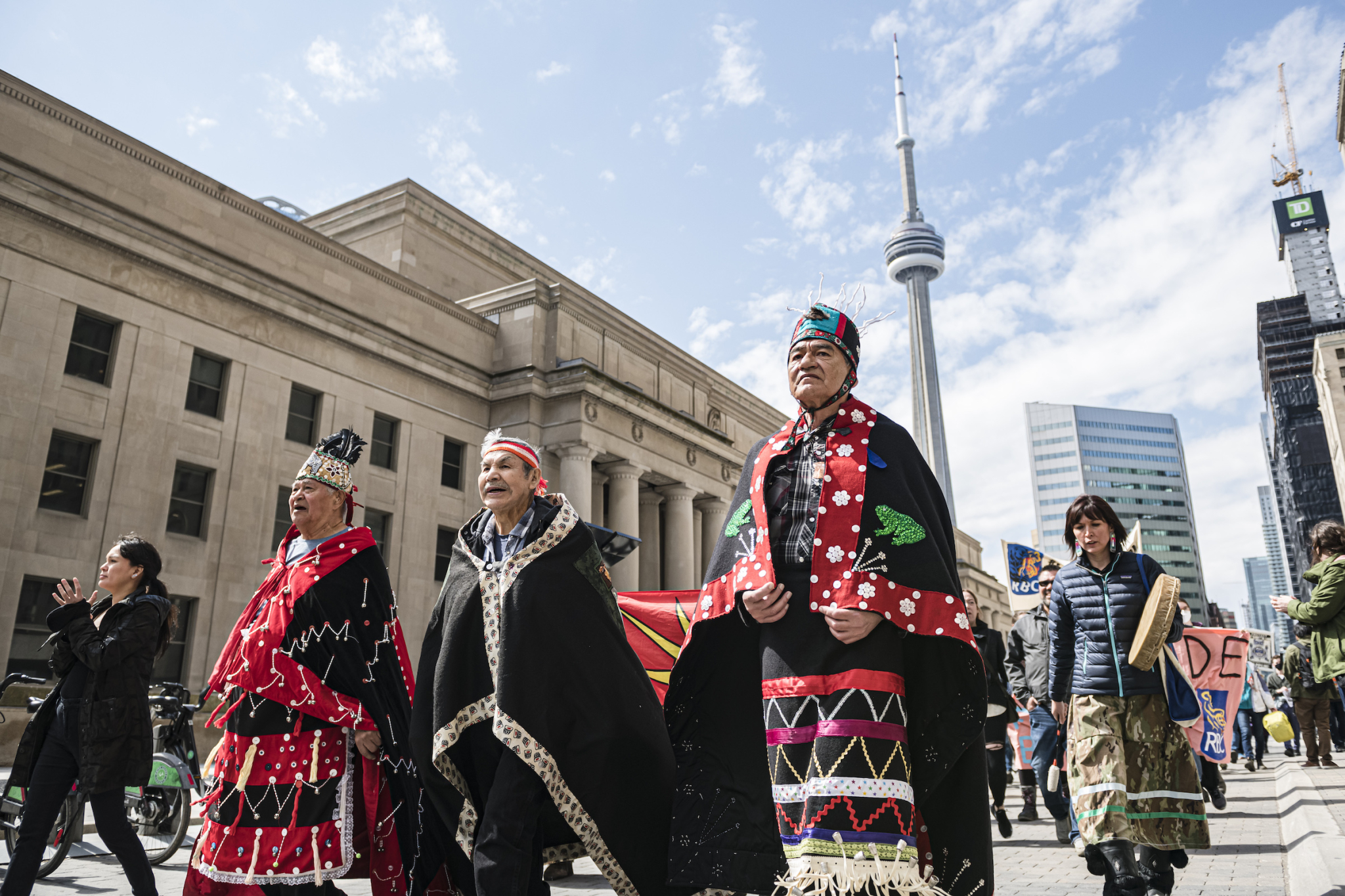

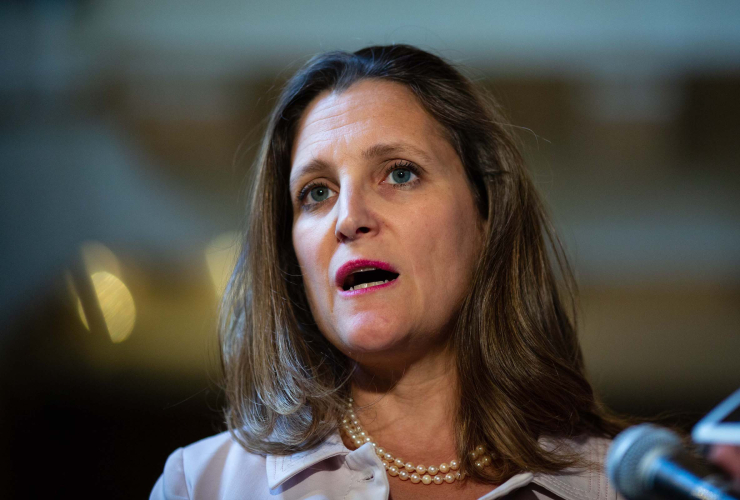
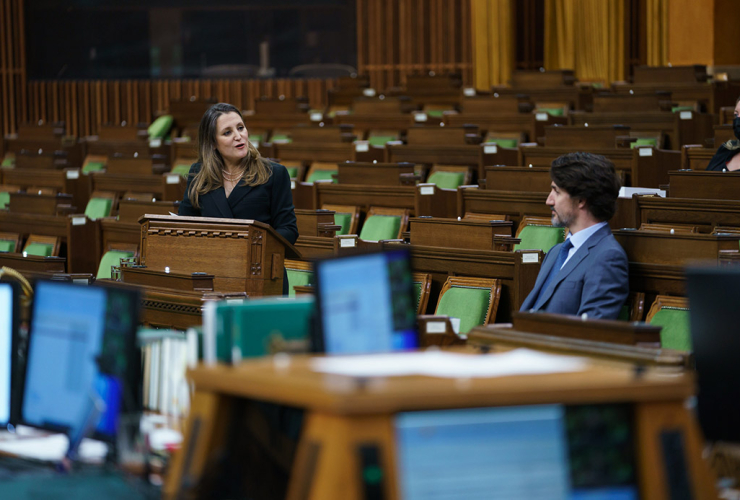
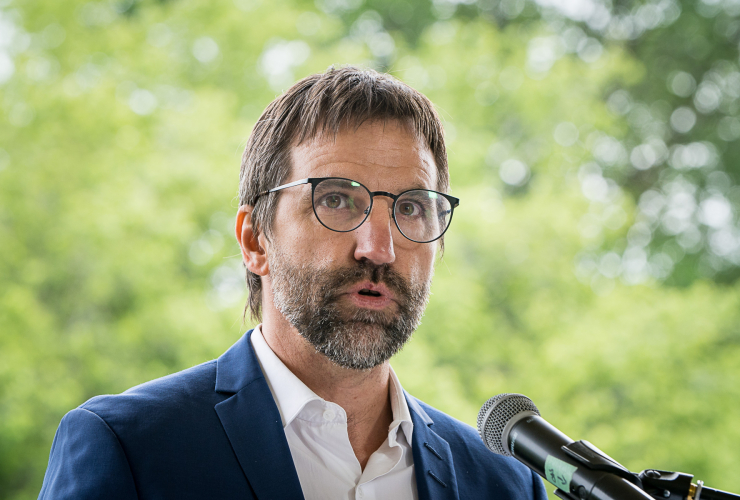
Comments